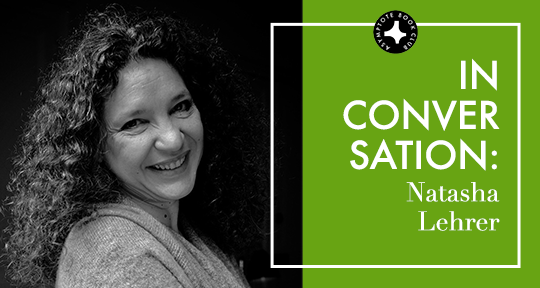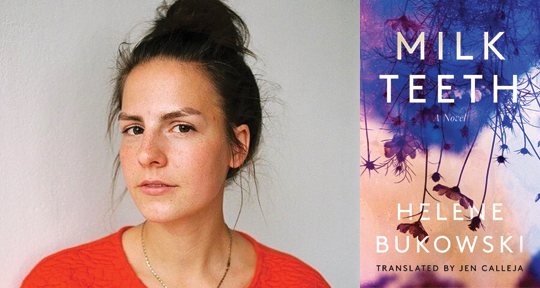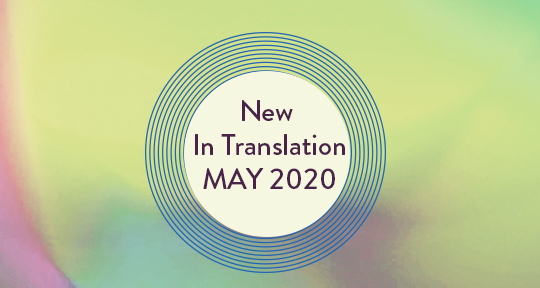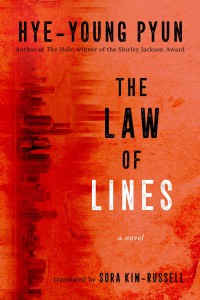On the Isle of Antioch is lauded Lebanese-French author Amin Maalouf’s philosophically rich take on the end-of-days novel. Told through the journals of Alexander, an artist living out his days on an island he shares with only one other person, this solitary existence is suddenly upended by a total communications blackout and power failure, followed by growing threats of global nuclear warfare. Through this narrative that builds on our contemporary forebodings, Maalouf weaves in the grand resonances of history and delicate moments of human connection to gather the touchpoints between consciousness and civilization, reality and belief. Skillfully taken into English by award-winning translator Natasha Lehrer, this modern myth was our final Book Club selection for 2023, and in the interview below, we speak to Lehrer about On the Isle of Antioch’s massive range, the novelist’s role, and the importance of ambiguity.
The Asymptote Book Club aspires to bring the best in translated fiction every month to readers around the world. You can sign up to receive next month’s selection on our website for as little as USD20 per book; once you’re a member, join our Facebook group for exclusive book club discussions and receive invitations to our members-only Zoom interviews with the author or the translator of each title.
Ruwa Alhayek (RA): On the Isle of Antioch resonates strongly with contemporary events like the COVID pandemic or current geopolitical tensions; it’s intriguing how the novel captures such fears, then deviates from initial impressions. Did ongoing events have an impact on your process of translation?
Natasha Lehrer (NL): The narrative absolutely echoes real-world concerns like the Ukrainian invasion and geopolitical tensions between the U.S., Iran, Armenia, and Azerbaijan. Sardar Sardarov initially appears as a Central Asian warlord, a nod to figures from the former Soviet Union. The theme of missing nuclear warheads also aligns with post-Soviet anxieties, cleverly naming and then subverting those fears.
But personally, translation is more of an intellectual exercise for me. I focus on achieving the right tone and voice for characters, especially when translating philosophical dialogues. For instance, translating an American character from French back into English is quite interesting, and Maalouf’s characters often speak in a philosophical manner rather than realistic dialogue. Reading the novel again after a year, I’m struck by the atmosphere of dread, fear, and eroticism. It’s exciting to realize that it works well, even though I wasn’t consciously conjuring specific atmospheres during translation. It’s more about accurately conveying Maalouf’s ideas. READ MORE…






What’s New in Translation: August 2021
New work this month from Lebanon and India!
The speed by which text travels is both a great fortune and a conundrum of our present days. As information and knowledge are transmitted in unthinkable immediacy, our capacity for receiving and comprehending worldly events is continuously challenged and reconstituted. It is, then, a great privilege to be able to sit down with a book that coherently and absorbingly sorts through the things that have happened. This month, we bring you two works that deal with the events of history with both clarity and intimacy. One a compelling, diaristic account of the devastating Beirut explosion of last year, and one a sensitive, sensual novel that delves into a woman’s life as she carries the trauma of Indian Partition. Read on to find out more.
Beirut 2020: Diary of the Collapse by Charif Majdalani, translated from French by Ruth Diver, Other Press, 2021
Review by Alex Tan, Assistant Editor
There’s a peculiar whiplash that comes from seeing the words “social distancing” in a newly published book, even if—as in the case of Charif Majdalani’s Beirut 2020: Diary of the Collapse—the reader is primed from the outset to anticipate an account of the pandemic’s devastations. For anyone to claim the discernment of hindsight feels all too premature—wrong, even, when there isn’t yet an aftermath to speak from.
But Majdalani’s testimony of disintegration, a compelling mélange of memoir and historical reckoning in Ruth Diver’s clear-eyed English translation, contains no such pretension. In the collective memory of 2020 as experienced by those in Beirut, Lebanon, the COVID-19 pandemic serves merely as stage lighting. It casts its eerie glow on the far deeper fractures within a country riven by “untrammelled liberalism” and “the endemic corruption of the ruling classes.”
Majdalani is great at conjuring an atmosphere of unease, the sense that something is about to give. And something, indeed, does; on August 4, 2020, a massive explosion of ammonium nitrate at the Port of Beirut shattered the lives of hundreds of thousands of people. A whole city collapsed, Majdalani repeatedly emphasises, in all of five seconds.
That cataclysmic event structures the diary’s chronology. Regardless of how much one knows of Lebanon’s troubled past, the succession of dates gathers an ominous velocity, hurtling toward its doomed end. Yet the text’s desultory form, delivering in poignant fragments day by elastic day, hour by ordinary hour, preserves an essential uncertainty—perhaps even a hope that the future might yet be otherwise.
Like the diary-writer, we intimate that the centre cannot hold, but cannot pinpoint exactly where or how. It is customary, in Lebanon, for things to be falling apart. Majdalani directs paranoia at opaque machinations first designated as mechanisms of “chance,” and later diagnosed as the “excessive factionalism” of a “caste of oligarchs in power.” Elsewhere, he christens them “warlords.” The two are practically synonymous in the book’s moral universe. Indeed, Beirut 2020’s lexicon frequently relies, for figures of powerlessness and governmental conspiracy, on a pantheon of supernatural beings. Soothsayers, Homeric gods, djinn, and ghosts make cameos in its metaphorical phantasmagoria. In the face of the indifferent quasi-divine, Lebanon’s lesser inhabitants can only speculate endlessly about the “shameless lies and pantomimes” produced with impunity. READ MORE…
Contributors:- Alex Tan
, - Fairuza Hanun
; Languages: - French
, - Hindi
; Places: - India
, - Lebanon
; Writers: - Charif Majdalani
, - Geetanjali Shree
; Tags: - Beirut 2020 explosion
, - diary
, - disaster
, - Indian Partition
, - motherhood
, - recovery
, - social commentary
, - trauma
, - womanhood